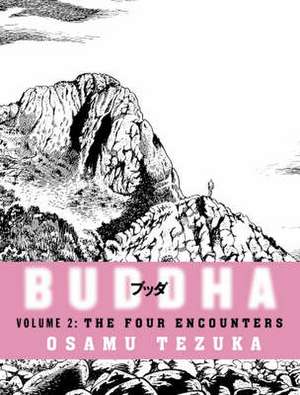The Four Encounters: Buddha, Book 2: Buddha
Autor Osama Tezukaen Limba Engleză Paperback – 18 apr 2006
Preț: 113.81 lei
Nou
21.78€ • 22.50$ • 18.12£
Comandă specială
Livrare economică 22-28 februarie
Specificații
ISBN-10: 0007224524
Pagini: 416
Ilustrații: chiefly Illustrations
Dimensiuni: 153 x 199 x 27 mm
Greutate: 0.35 kg
Editura: Harper Collins Publishers
Seria Buddha
Locul publicării:United Kingdom
Notă biografică
Osamu Tezuka (1928-89) is the godfather of Japanese graphic novels. A genuine intellectual, deeply familiar with Western culture from the Bible to Goethe to Hollywood, Tezuka originally intended to become a doctor and received an M.D. Though many have followed his example, it is still Tezuka who draws the deepest awe with his sweeping vision, deftly intertwined plots, persuasive characters, feel for the workings of power, and above all, an indefatigable commitment to human dignity and the sanctity of life.
Recenzii
Descriere
The second book in the classic eight volume graphic novel series retelling the story of Buddha, from the godfather of the genre – an irreverent and humourous rendition of the life and times of Prince Siddhartha.
In book two, The Four Encounters, Prince Siddartha – fated to become the Buddha – is confronted by the harsh penalties of social injustice within his own kingdom, fuelled by selfish warlords and villains like the depraved warrior, Bandaka. The tragic fortunes of his loved-ones, such as Tatta the rogue and Migalia the fierce female bandit, force the Prince to choose between love and destiny; Siddartha must forsake his heart and begin his pilgrimage.
Originated in the 1970s, Buddha is Osamu Tezuka's unparalleled rendition of the life and times of Prince Siddhartha.
Tezuka's storytelling genius and consummate skill at visual expression blossom fully as he contextualizes the Buddha's ideas; with an emphasis on, action, emotion, humour and conflict as Prince Siddhartha runs away from home, travels across India and questions Hindu practices such as ascetic self-mutilation and caste oppression.
Rather than recommend resignation and impassivity, Tezuka's Buddha predicates enlightenment upon recognizing the interconnectedness of life, having compassion for the suffering, and ordering one's life sensibly, his approach is slightly irreverent in that it incorporates something that Western commentators often eschew, namely, humour.




























